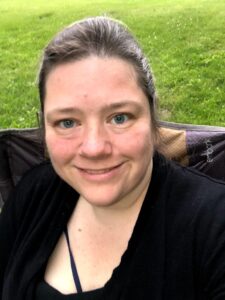by Krista Dutt, originally published by Mennonite Church USA Communications
Creative, simple efforts can reduce violence
This blog is in recognition of National Gun Violence Awareness Day, June 23.

Krista Dutt is currently the Mennonite Central Committee Chicago (Illinois) program coordinator. Most of her work is focused in the areas of gun violence prevention and mass incarceration. She has degrees from Bluffton University and Anabaptist Mennonite Biblical Seminary, and she wrote a book, but she is on such a steep learning curve to understand and practice abolitionist and restorative justice principles that she feels like she is just beginning her education. Krista loves exploring Chicago, appreciates trying new foods and thinks that listening to podcasts while walking in a park may provide a glimpse into what heaven might be like. She attends River City Community Church.
______________________________
My child’s school recently started conversations about what role they have in reducing violence in their neighborhood. Since I have the privilege to work with partners across the country working on gun violence prevention, I popped into the school office one day, offering support. As an administrator and I talked, I felt like she might be feeling how many of us do — becoming overwhelmed thinking about what grand gesture the school should throw its energy into.
Therefore, I wondered aloud, “What are the creative, simple ways that we can reduce violence?”
In my work in Chicago, I see how simple creative solutions and actions work well to reduce violence.
Parents for Peace and Justice started because a grieving parent, Elizabeth Ramirez, whose son was killed by gun violence, went on Facebook and asked who might be willing to help parents like her grieve well. A friend of a friend, Robert Torres, responded, and now, this organization provides care, support and therapy for hurting family members. In addition, they provide avenues for these families to prevent violence by working in after-school programming, as well as advocate with these families to change local and state laws surrounding gun violence prevention.
Arielle Maldonado and Krystal Robledo noticed violence in their neighborhood. They wanted something to change. They created the Healing Corner, where they put up a sign that said, “Free Hugs” and set out some bottled water. They went to a corner that had experienced several shootings and provided space and conversation. They really thought it would be a one-time thing, but it went so well, they did it again and again. The Healing Corner now usually involves free snow cones and some kind of other food. Sometimes a person dressed up like Olaf from Frozen comes, and Andy’s usually there drawing caricatures of folks. While all of that is happening, the space is reclaimed from a place of death to a space of life.
Similarly, Tamar Manasseh got tired of the violence on her block and started taking a chair to the sidewalk to make connections with kids and adults as they walked by. Other mothers started joining her, and soon, violence was reduced, as relationships developed. MASK (Mothers/Men Against Senseless Killing), the organization that resulted from Tamar’s efforts, describes itself as “A group of caring individuals in the community began to simply hang out on the block, cook food, and emanate love. People began to notice neighbors were watching out for each other, and it was contagious.”
Through both MASK and The Healing Corner, people got to know each other, and mutual aid started organically, which allowed additional stability for the communities these organizations support.
Community efforts like these are proven to reduce violence.[1] Investing in public education and providing trauma-informed care are also proven to reduce gun violence in all forms.[2] In “Beating Guns: Hope for People who are Weary of Violence,” Shane Claiborne and Mike Martin write about how toxic masculinity can cause more gun violence. Several research studies have found that working to change men’s understanding of themselves changes violent outcomes in neighborhoods.[3] In addition to people-focused efforts, study after study also shows green spaces and gardens reduce violence.[4]
Should we advocate for systemic change around guns? Absolutely. Should we allow our peace witness radiate into the national debate about guns? For sure.
We need the sweeping grand gestures, but that should not stop us from considering the simple, yet creative, solutions that might exist within us to fight gun violence.
Does your church have a lawn that they might make accessible for use by the neighborhood? How does your church or household make connections with your neighborhood? Could you give time and/or money to suicide prevention organizations and causes? Could your community work to determine if a gun buyback would be possible?[5] Would this be a good time to think through your goals as a congregation, if an armed intruder would come in?[6] Could you host a circle process that allows men in your community to express pain and emotion? Could you lament gun violence with your community by hosting a RAWtools event to transform a gun into a garden tool?
[1] See https://time.com/6191609/6-ways-to-reduce-gun-violence/, and https://jamanetwork.com/journals/jamapsychiatry/fullarticle/2769625.
[2] See https://news.temple.edu/news/2022-12-07/how-to-solve-American-gun-epidemic.
[3] See https://racism.org/articles/basic-needs/412-eliminating-violence/11014-toxic-masculinity.
[4] See https://doi.org/10.1162/daed_a_01886.
[5] See https://ajph.aphapublications.org/doi/full/10.2105/AJPH.2013.301409, Learn more about gun buybacks at https://www.gunstogardens.org/about.
[6] See https://mcc.org/fear-not-creating-plan-respond-active-violence.
The views and opinions expressed in this blog belong to the author and are not intended to represent the views of the MC USA Executive Board or staff.
Interested in submitting a blog for Menno Snapshots? Please see our blog guidelines here.

